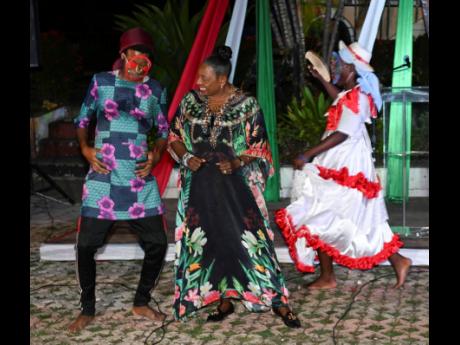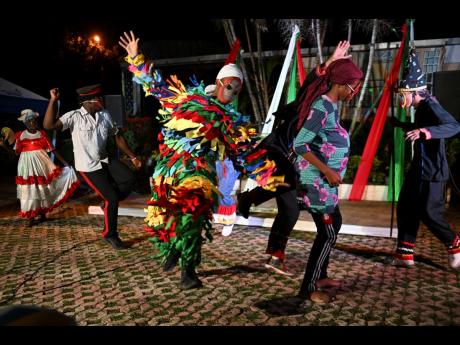Gov’t offers help in preserving Jamaica’s heritage
Jonkunoo Road March and Competition launched
The Ministry of Culture, Gender, Entertainment and Sport (MCGES) is calling for proposals from individuals and groups interested in preserving Jamaican culture and heritage.
Declaring, “I look forward to us working together,” the minister, Olivia Grange, also pointed to another source of help, a United Nations Educational Scientific and Cultural Organization (UNESCO) fund dedicated to such preservation. She was speaking on Tuesday at the launch of a Jonkunoo Road March and Competition at the Louise Bennett-Coverley Garden Theatre on Hope Road.
The organiser of the project was The Institute of Creative Training & Development (ICTD), which is chaired by educator and entrepreneur, Kenny Salmon, in co-operation with 24/7 Productions Ltd. Assistance also came from the MCGES, CHASE, the Jamaica Cultural Development Commission (JCDC) and Clearsound Production Services.
Jonkunoo is a Christmastide tradition that tapped into the island’s African spiritual roots through a mix of costumes, music and dance. Dating back hundreds of years (to John Konny, a West African tribal chief), the activity was widely indulged in by the enslaved as part of their holiday celebrations. It later spread to other Caribbean islands, Bermuda and North Carolina.
Grange said that the African retention was one of the most popular forms of resistance by enslaved Africans to slavery. In the post-emancipation era into modern Jamaica, the celebration took on a more festive tone and Jonkunoo bands were formed all across the island.
In fact, in planning the Jamaica 60 celebrations, Grange revealed, Prime Minister Andrew Holness said he wanted to see a Jonkunoo band at the National Stadium for the Grand Gala. Unfortunately, that wasn’t to be, Grange said, but since celebration of our 60th anniversary continues until Jamaica turns 61, she hoped to see a number of Jonkunoo bands at Grand Gala 2023.
“It will be interesting,” she mused, “to see the reaction of children to the Jonkunoo bands in the National Stadium.” She then admitted that she feared them when she was a child.
She said that as Jamaica became more modern, Jonkunoo bands began to disappear, to be replaced by modern Christmas practices, copied mostly from America. “Many Jamaicans lament the disappearance of Jonkunoo and other folk traditions and the lack of knowledge of our culture and identity,” she added.
She pointed out that preservation of our culture will require the establishment of institutions to foster, bolster and promote these traditions. That will involve the regular staging of exhibitions and expositions to maintain the imagery and the relevance of the tradition.
She said that the JCDC had its work to do as the primary cultural entity of government with a network across the island, but the commission needed the support of institutions like the ICTD.
“I look forward to us working together,” Grange said, going on to mandate that the JCDC work very closely with the ICDT to ensure that it achieves its objectives and that the government of Jamaica fulfils its own mandate to preserve and promote the island’s heritage.
Grange added that the MCGES was particularly concerned with preserving Jonkunoo and Kumina and would see that there were workshops across the island particularly for those cultural forms.
“We will work together with institutions to ensure that we involve our young people,” Grange stressed, as when knowledgeable seniors die some culture disappears.
DANCEHALL’S BEGINNING
Culture consultant Sydney Bartley, who hosted the launch ceremony, entertained the audience with this fascinating anecdote of the origin of dancehall.
“Some years ago when I was chairman of the Clarendon cultural committee and Mr Seaga was prime minister, he used to bring all the chairmen from the parishes together before Independence festival. We’d have this grand three-day conference at some hotel in Kingston.
“We used to have a pop and variety competition and one of the areas of the competition was DJ, as we used to call it. DJ was becoming very popular and I went into a meeting and one Miss Babsy Grange walked up to the podium and said, ‘I am going to take DJ out of pop and variety and put it as a category by itself.’
“I opposed the idea, but Miss Grange said, ‘I am going to take you to some dancehall session and you’ll see what is going on why I want dancehall to be moved out of pop and variety.’
“The very first stand-alone dancehall competition was won by King Yellow Man. That move was literally responsible for the explosion of dancehall into what we are seeing now,” Bartley said, “and many of the dancehall artistes appreciate it.”


